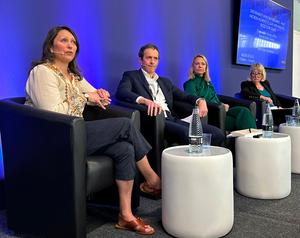 "I'm rapidly coming to the conclusion that you have to win the hearts and minds," said Rachel Martin, global director of sustainability at Elsevier, during a panel Wednesday afternoon at the London Book Fair about sustainability in publishing.
"I'm rapidly coming to the conclusion that you have to win the hearts and minds," said Rachel Martin, global director of sustainability at Elsevier, during a panel Wednesday afternoon at the London Book Fair about sustainability in publishing.
Martin, along with Jude Drake, head of sustainability at Bloomsbury, Fabrice Bakhouche; deputy CEO of Hachette Livre; and Amanda Ridout, founder and CEO of Boldwood Books and chair of the Independent Publisher Guild's Sustainability Action Group, convened to discuss what publishing has accomplished so far and what it still needs to do. Ashley Gordon, publishing market development manager at HP, moderated the discussion.
So often, Martin continued, discussions about climate change and sustainability tend to be very technical and come off as "doom and gloom," but in her view it is "really a heart matter." Elsevier, which has reduced its direct emissions by 70% since 2017, has done so through the use of "really good data" about the company’s own direct emissions and through creating a sustainability mindset that has everyone in the organization "pointing in the same direction." That commitment to sustainability is created through "carrots, not sticks."
 |
|
| Left to right: Jude Drake, Fabrice Bakhouche, Rachel Martin, Amanda Ridout | |
For example, if organizations want to create a responsible travel program that may limit air travel and prioritize train travel, "give them business class," she said. "Make it good." And in a similar vein, if people are bemoaning the end of unlimited travel, emphasize that "unlimited travel was unsustainable," and invite employees to help imagine "something that is even better."
Bakhouche reported that Hachette Livre performed its first carbon assessment, which was focused on its French operations, in 2009. By 2020, the company had achieved a 20% reduction in emissions, and at the end of 2021 the company made another carbon assessment, this one "more global." It encompassed Hachette’s operations in the U.S., U.K., Spain, and Mexico, and the company committed to reduce emissions by a further 30% by 2030.
That, Bakhouche said, is a "very, very ambitious" goal, one that will impact Hachette's entire business model and how "we produce, design and ship books." He pointed to three main areas where there is the most work to be done, including overproduction and returns, partnerships with printers and suppliers, and transportation, specifically air freight. He remarked: "It will be a very big shift."
At Bloomsbury, Drake reported, the sustainability journey started in earnest about four years ago. The company has already achieved a 30% reduction in emissions, and last September completed the CDP Climate Change Questionnaire, receiving a B score. Bloomsbury also has a program for its employees called Live Greener, which aims to inspire people, create a sustainability mindset, and "demystify things." The company also provides information about employee pensions and how they are invested, with Drake noting that pensions have gone from being 30% invested in sustainable businesses to 60%.
Ridout reported that the IPG is preparing something called the zero carbon toolkit, an online resource that will provide publishers with practical solutions for making their businesses more sustainable. Noting that many member publishers are looking at their own emissions and their own suppliers independently, the IPG's task force wondered what it could do best as an industry body. The answer was "supply chain," and the task force sought to get "real-time data" across every level of the industry.
This led to the Book Journeys project, which details the environmental impact of six different scenarios of a book going from printing to a customer's hands. What came out of the first Book Journeys project, Ridout said, is "localizing printing." Print-on-demand is a large part of that, with Ridout pointing out that POD "doesn't answer" the question for the children's sector yet. Another Book Journeys project is in the works that will focus on end of life, and she added that the "elephant" in the publishing world is returns. There is a "real lack of data on it," and everybody is "nervous about it."
There are two things "we feel really strongly" that anyone can do, Ridout continued. The first is collaborating, which she remarked should not be as radical a suggestion as it is, and the second is questioning. For the former, the industry "genuinely needs to come together" to combat climate change, and she urged publishers to share their sustainability data and "don't be protectionist." For the latter, everyone should question why things are done a certain way and whether there are ways to make it more sustainable. Authors, she added, have more power in this regard than they might think.
Asked about the most difficult challenges in the way of publishers' sustainability goals, the panelists gave varied answers. Bakhouche returned to overproduction, calling it "probably the main challenge," and said publishers will have to print in a smart way and be as "accurate as we can" with print runs.
Ridout acknowledged that overproduction is a big challenge, but it at least is one that is "within our own hands to solve." She remarked that the discussion hadn't "talked about consumers at all," and she said the industry needs to "get our house in order" before showing a "united front to consumers." They will have to be educated as to why they "may have to pay more for books" in the name of sustainability. Drake agreed that consumer perception--"what’s expected of a book"--poses a significant challenge.
Martin pointed to finance as the single biggest challenge. At the moment publishers are in a "sweet spot," where most sustainability efforts thus far have actually reduced costs. That hasn't created any real problems yet, as "finance is happy," but Martin wondered what will happen when publishers reach the point where better sustainability means sacrificing revenue. As it stands, "sustainability is not valued" in most business models, and she wasn't sure what will happen when the industry reaches that tipping point. --Alex Mutter

